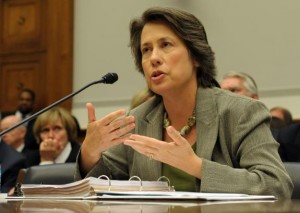Bank Failures and Bank Successes (Great Southern Bancorp)
According to the news, the FDIC’s insurance fund is in danger of being totally drained. The article’s author speaks of several strategies that can be used to shore it up, which is borrowing money from banks, from the government, or by levying a special fee on banks. The article portrays all of these as risky and unnatural options. Borrowing money from banks that can afford to lend it is called a bad idea because it diverts money from the private sector. Borrowing money from the government is bad because it looks like another bailout. And raising the money by a special bank fee weakens banks that cannot afford to be weakened right now.
 As to borrowing the money from healthy banks, any effect on the private sector from removing the money would be dwarfed by the fallout from the massive bank run if an investor actually suffered a loss due to the bankruptcy of the FDIC. Of course, since the bankruptcy of the FDIC fund is not seriously an option this is not going to occur. However, it seems to be unreasonable for the FDIC to have to pay interest to one bank on behalf of the depositors of another. Using the Treasury’s line of credit would make more sense, although it does look like another bailout to the banking industry, and banks themselves are not looking forward to higher fees down the road to repay interest and principal.
As to borrowing the money from healthy banks, any effect on the private sector from removing the money would be dwarfed by the fallout from the massive bank run if an investor actually suffered a loss due to the bankruptcy of the FDIC. Of course, since the bankruptcy of the FDIC fund is not seriously an option this is not going to occur. However, it seems to be unreasonable for the FDIC to have to pay interest to one bank on behalf of the depositors of another. Using the Treasury’s line of credit would make more sense, although it does look like another bailout to the banking industry, and banks themselves are not looking forward to higher fees down the road to repay interest and principal.
Of course, these would be the banks that are the problem in the first place, and who do not seem to be aware of the concept of insurance. Obviously, a sound system of insurance requires risk-based pricing, so as risks go up an insurance company has to increase its premiums accordingly in order to remain solvent. And it seems to me that if a bank cannot handle an occasional disruptive, unforeseen expense like this, it would be better off in receivership. After all, there are plenty of wealthy banks that are capable of taking them on.
Great Southern Bancorp (GSBC) for example, has taken on two failed banks this year. Although the economic situation has impacted their results they have been able to squeeze out some profits, and on the whole I believe them to be in an excellent financial condition. However, I’m not exactly pleased about their handling of loan loss reserves. Capital One deals with reserves in the aggregate, which, considering their size, they have to do. As recently as 3rd quarter 2008, GSBC reported non-performing commercial loans singly, as befits a small town bank. However, since their transfers to loan losses normally run only a few million per quarter, a cluster of bad loans can produce a huge mess in unforeseen expense. In 1st quarter 2008, they lost a great deal of money (for them) by loaning a large sum to bail out a fellow bank that subsequently went under, and not very much later they lost another small fortune on Fannie and Freddie preferred stock. Since these experiences they seem to have learned to wait until after the receivership/bailout to commit capital to banks. If their earnings return to normal they would have a P/E ratio of 10 or 11 which is suitable for a normal bank, although the TARP money they accepted forbids them from raising their dividend.
So, if you want a bank, rather than gamble on the recovery of an unwieldy large bank that needs the special attention of the Treasury, consider a small one that is busy eating smaller ones.
[…] Bank Failures and Bank Successes (Great Southern Bancorp … […]